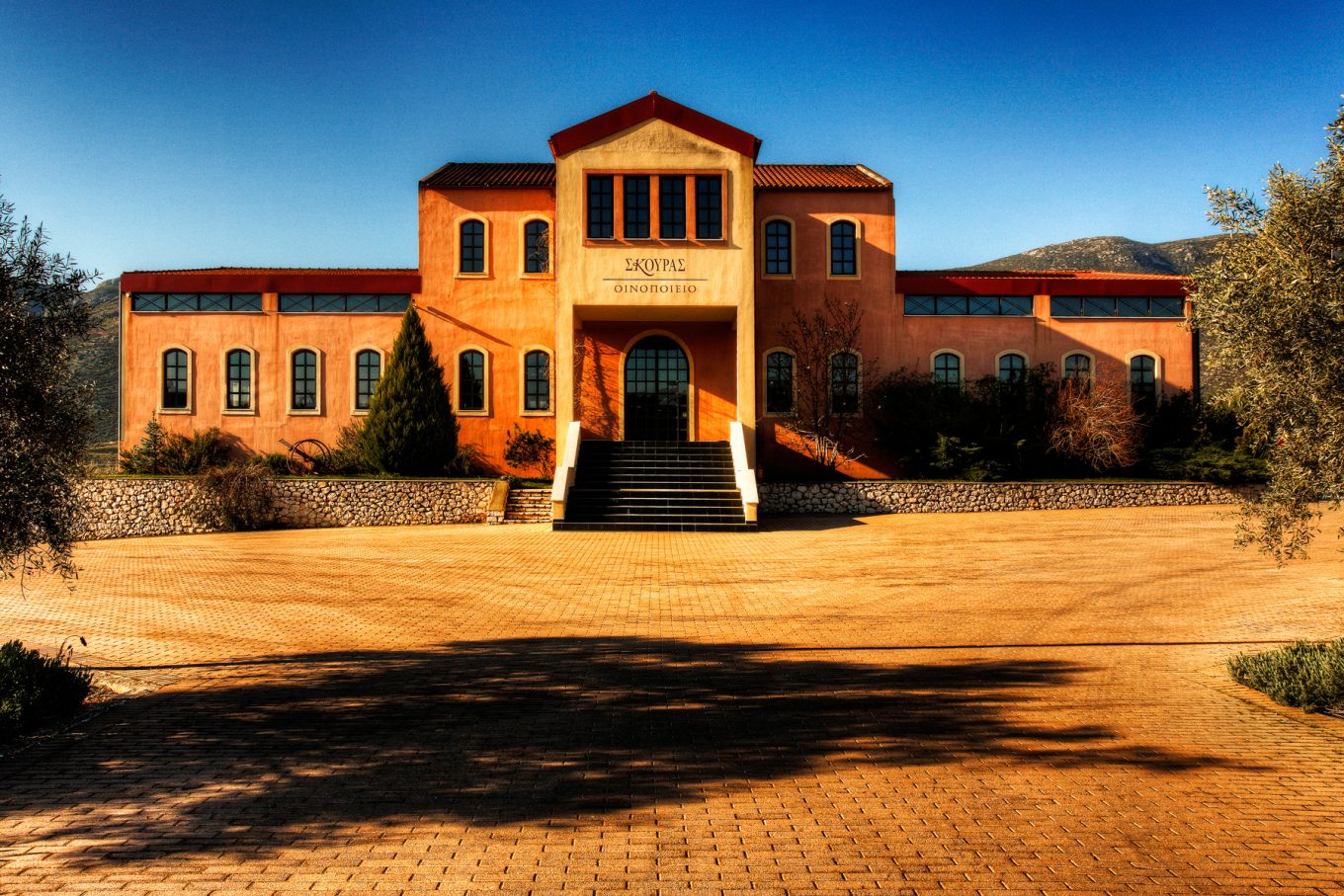
We have just left the austere, imposing citadel of Mycenae and the monumental tomb of Agamemnon behind to drive across a blazing plain to the village of Malandreni. We are in the region of Nemea, in the North-Eastern Peloponnese, a land literally drenched in history, with a tradition of wine production and consumption stretching back several millennia, all wrapped up with myth and legend. It is also the largest PDO for red wines in Greece, while nearby Mantineia carries a PDO for Moschofilero (Mohs-koh- fee-leh-roh), and the excellent whites it produces.

On this open plain, ridged around with hills, the spare, clean lines and honey coloured stone of the Domaine Skouras winery blend effortlessly with the landscape. Walking through the ultra-modern, pared down interiors, we are guided to the back of the winery, which opens onto vineyards, where George Skouras is overseeing the crushing of the latest harvest of the indigenous pink-skinned Moschofilero, known for its high acidity and distinctive aromatics. Although it’s a Saturday, and the winery is closed to visitors, Mr. Skouras has kindly agreed to meet us. Over the din of the machinery, he urges us to taste the grapes and breathe in the beautiful, distinctive aromas. A little later, amongst several other wines that we will sample is the 2015 Salto, which harnesses the grape’s wild yeasts to deliver a complex, elegant wine with notes of bright citrus, hints of tropical fruits and excellent acidity. Domaine Skouras’ 2016 Moschofilero has just earned 92 points from Mark Squires and Robert Parker. A couple of decades ago, however, the scenario could not have been more different.

In 1986, George Skouras returned to his hometown with a degree in viticulture and oenology from the University of Dijon, Burgundy, six years’ experience working in reputed vineyards in France and Italy, a stint at Gentilini, in Greece –and little else.
“I rode all over these hillsides on my motorbike,” he recalls, “and found that the land had absolutely no facilities, no infrastructure. The 1980’s was also a time when the image of Greek wines was very poor, and consumption was low. It was all about retsina and homemade wines, and although it was very difficult, we had to find a way to change these perceptions.”

So, without land or equipment, dependent on leased vineyards, rented equipment and manual bottling machines, driven solely by a vision of producing high quality Greek wines, Domaine Skouras was born in George Skouras’ father’s garage. The first production was 6000 bottles, with all the work done manually.
It was in many ways a decisive period in the history of modern Greek winemaking, and the Skouras story is intertwined with it: like George Skouras, there were a number of Greek oenologists and winemakers who had recently returned to Greece, bringing with them training and expertise garnered in the vineyards and universities of Europe. Their coming together became a movement, recalls Skouras, with the younger ones driving the changes. “We became friends and collaborators; we worked on retrieving Greek varietals, and of the over 300 that are available, we decided to showcase just four over the first five years. After that, there was much experimentation.” This association is now 30 years old and has played an energetic role in steering the Greek wine industry to where it is today, with individuals like George Skouras –who is currently the President of the Greek Wine Federation –pushing for international recognition for local varietals and wines.

In 1988, Domaine Skouras launched Megas Oenos, with 80% Agiorgitiko (Ah-your-yee-ti-ko) and 20% Cabernet Sauvignon. It was the first time an indigenous Greek varietal had been blended with Cabernet Sauvignon. In his pioneering efforts to create an identity for Greek wines, for this path-breaking wine, George Skouras chose a grape that, as he explains, “…grows from sea level, and Nemea’s 250meters, to 650 meters and 1 kilometer above sea level in the hills, giving you a six- week difference in harvest timings –in effect, a completely different grape.”
Today, Agiorgitiko –from ‘St. George’, the old Ottoman appellation for Nemea –is the indigenous varietal most easily recognized internationally; terroir driven, it is appreciated for its versatility in making wines ranging from light rosés and medium-bodied to full-bodied, intense reds, rich colour, its characteristic aromas of red fruit and excellent aging potential. The long, hot summers and moderate winters, the proximity to the sea, the considerable variations in altitude contribute to creating multiple climatic zone in the Peloponnese, ideal for viticulture, within which the upper elevations of Nemea offer clay and limestone soils and mesoclimates that produce the top-quality reds in the region.

Domaine Skouras owns 80 acres of vineyards spread across Nemea and Agrolida of age spans ranging from 30 to 70 years; a state-of-the-art winery; 1000 French oak barrels, one third of them replaced every year; a production of over 50,000 cases of wine a year and a slew of national and international awards to its credit.
“Greece, with its upwards of 10 million visitors every year is still the biggest consumer of its own wines. At Domaine Skouras, we sell half our production overseas, mainly in the United States, some to Europe, Australia and a little to China; the rest is consumed locally.” Skouras’ investment in the North American market has been highly directed and sustained, reflected most recently in the 2016 Wine and Spirits Magazine annual restaurant poll of 50 most popular wines in America’s best restaurants, where their wines feature prominently. My own introduction to Greek wines began in New York’s fine dining restaurants, where I made myself familiar with names like Assyrtiko, Robola and Malagousia, and drank the wines with surprise and pleasure.

To listen to George Skouras speak of his 30 years in winemaking, is to follow the story of the modern Greek wine industry. Charismatic, focused and deeply passionate about the identity and quality of Greek wines, he is in the unique position –along with some of his contemporaries –of having seen the evolution of modern Greek winemaking and of having worked to revitalize it. He has seen the refining of winemaking practices, and the number of wine producers grow from about 70 to over 1000 and the increasing attention that is being paid to wines made from hitherto unfamiliar local varietals.

One is impressed by the precision, strategy, knowledge and deep commitment that have shaped his vision of producing high quality wines, wines of character, and extending this experience to the Greek wine industry, as well as promoting a wine drinking culture.
“We now have wine journals, sommeliers and wine writers. Look at Athens,” he points out, “wine bars have grown all over the city, and they have survived the crisis of 2008. We encourage the culture of drinking wine, and consciously make entry level wines such as Akoes, priced competitively at 5 euros.”

At his recommendation, we visit a few trendy wine bars in Athens a few days later. At Oinoscent, which stocks 700 labels in its cellars, and offers a choice of over 50 wines by the glass, and the ease of pairing with small plates, we find a highly motivated and knowledgeable young team. Aris Sklavenitis, oenologist and wine counselor, who was the best Greek Sommelier of 2016, speaks with us at length about Greek wines and leads us through several choices of local wines of excellent quality. Elsewhere, Konstantinos Lazarakis, Master of Wine, has cited his first taste of Skouras’ Megas Oenos, the experience of the complexity and depth it presented, as the reason he made a career change into the world of wine. A well-established wine culture that inspires a young generation of wine professionals comes in no small part from the efforts of pioneers like George Skouras, from an investment in the future. It’s a vision of what he wanted Greek wines to be, taking in the historicity and the antiquity of the wine culture, and marrying it with science, modernity and sheer hard work to create a distinctive identity. With a range of unique, yet to be studied varietals, many of them of great antiquity, and a new generation of young winemakers and viticulturists, often working family-owned small productions, willing to push the current boundaries of winemaking to produce high quality, distinctive wines of place, there will be much to look forward to from Greece in the near future.

his article was published in Sommelier India Magazine Volume 13: Issue 6, November-December 2017
Image Credits: Domaine Skouras





tset